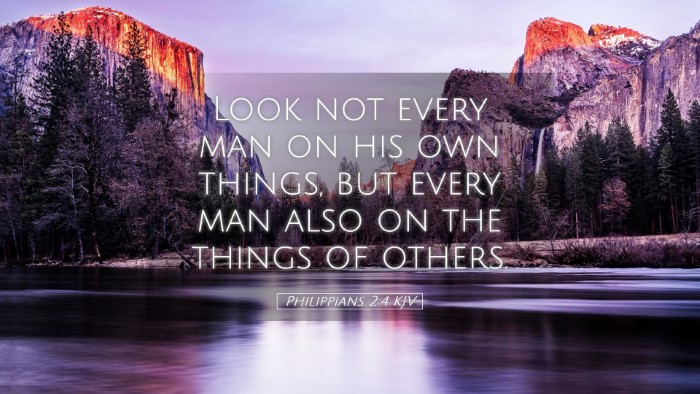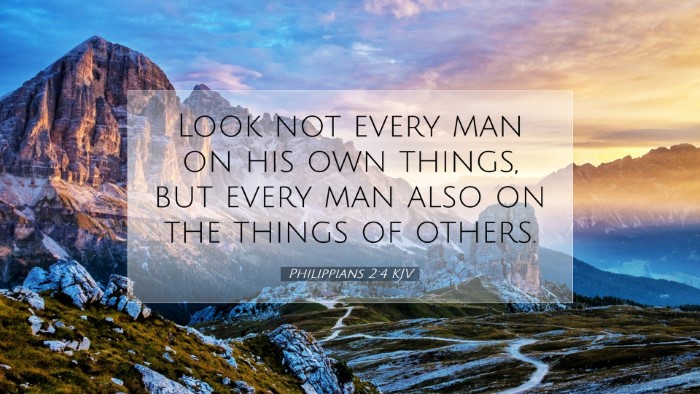Commentary on Philippians 2:4
Text of Philippians 2:4 (KJV): "Look not every man on his own things, but every man also on the things of others."
Introduction
This verse encapsulates a profound principle of Christian living: the call to selflessness and concern for others. In the context of Philippians, the Apostle Paul encourages the church to emulate the humility and the service of Christ. This commentary synthesizes insights from respected public domain commentaries such as Matthew Henry, Albert Barnes, and Adam Clarke.
Verse Analysis
-
Selflessness in Perspective:
Paul's directive emphasizes an essential shift in perspective—from a self-centered outlook to one that focuses on the needs and welfare of others. Matthew Henry notes that this approach requires a denial of one’s own interests for the benefit of fellow believers.
-
Collective Responsibility:
Albert Barnes highlights the communal aspect of faith where believers are called to bear one another's burdens (Galatians 6:2). This notion reinforces the teachings of love and unity within the body of Christ, encouraging the Philippians to consider each other’s needs as significant as their own.
-
The Model of Christ's Humility:
Paul’s exhortation is rooted in the preceding verses, where he presents the example of Christ, who, though in the form of God, took on the likeness of men (Philippians 2:5-8). Adam Clarke elaborates that the self-emptying of Christ illustrates the humility and priority that ought to define Christian conduct.
Key Themes
-
Mutual Care:
The exhortation "look not every man on his own things" emphasizes the necessity for mutual care and concern. As illustrated in the Old Testament, the principle of loving one’s neighbor is foundational to God's law (Leviticus 19:18), and this carries into the New Covenant.
-
Esteeming Others Higher:
The Apostle’s statement aligns with the wider context of Christian ethics—that believers should "in lowliness of mind let each esteem other better than themselves" (Philippians 2:3). Matthew Henry advises that genuine humility comes from recognizing the value and needs of others above our own.
-
The Contrast with Worldly Attitudes:
Paul’s call serves to contrast the prevailing self-serving attitudes often found in society. Albert Barnes suggests that the call to look to others' things counters the natural tendency towards selfishness, urging believers to challenge societal norms with the transformative love of Christ.
Practical Applications
-
In Community Life:
Pastors and church leaders can implement this teaching by cultivating an environment where members actively engage in caring for one another’s needs, whether spiritual, emotional, or physical. This selflessness strengthens the bonds of the church.
-
In Personal Relationships:
Students and scholars should apply this principle in their personal interactions, fostering a mindset that prioritizes the well-being of peers and colleagues, thereby reflecting Christ’s attitude of servitude.
-
In Ministry:
For those involved in outreach and ministry, this verse becomes a guiding principle in mission work—addressing not only the spiritual needs but also the social and physical needs of the community.
Conclusion
Philippians 2:4 presents a vital challenge and encouragement for Christians to live in a way that reflects the heart of the Gospel—selfless service and genuine love for one another. As believers meditate on this exhortation from Paul, it is imperative that they embody these values in all aspects of life, thereby fulfilling the law of Christ.


